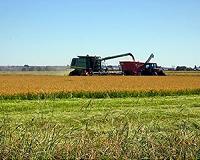 |
Madriad, Spain (SPX) Mar 18, 2011 The study, which has been published in Trends in Plant Science, provides an overview of plants' molecular and genetic mechanisms, which is important for ecologists, physiologists and molecular biologists, since it covers the prime requirements for anticipating plants' response to global change. The results show that plants in natural and agricultural systems have "the capacity to adapt to a changing environment without requiring any evolutionary changes, which always happens over several generations", Fernando Valladares, one of the authors of the paper and a researcher at the National Museum of Natural Sciences (CSIC), tells SINC. All plant species exhibit a greater or lesser degree of plasticity. "Various studies suggest that species from more heterogeneous and changing environments have greater degrees of plasticity. For example, plants from these environments have great root plasticity in order to be able to take better advantage of fertile and damp areas and to avoid sterile, dry ones", Valladares explains. Plants' pigmentation, root length, leaf mass and efficiency of water use are some of the leading indicators used to study the phenotypic plasticity of plant organisms. "The differences in plasticity and its mechanisms allow us to better understand why various plant species grow where they do. This will enable us to project their most likely ranges in climate change scenarios", the researcher says. Less productivity, greater survival The advantages of plants changing their structure and function in the face of environmental change "could lead to the selection - in the case of crops - of more plastic varieties, which may not necessarily be the most productive, nor have the most easily-predictable productivity", the scientist stresses. According to Valladares, the next step is "to understand the mechanisms that underlie plasticity, such as epigenetics - non-genetic factors that determine an organism's development - and how this impacts on the biological efficacy of wild species or on the long-term yield of agricultural species". A. B. Nicotra, O. K. Atkin, S. P. Bonser, A.M.Davidson, E. J. Finnegan, U. Mathesius, P. Poot, M. D. Purugganan, C. L. Richards, F. Valladares, M. van Kleunen. "Plant phenotypic plasticity in a changing climate". Trends in Plant Science. 2010. doi:10.1016/j.tplants.2010.09.008
Share This Article With Planet Earth
Related Links FECYT - Spanish Foundation for Science and Technology Farming Today - Suppliers and Technology
 Natural Sequence Farming
Natural Sequence FarmingWashington DC (SPX) Mar 18, 2011 Improving land management and farming practices in Australia could have an effect on global climate change, according to a study published in the International Journal of Water. Natural Sequence Farming is a descriptor used when sustainable agriculture mimics the once highly efficient functions of the Australian landscape. NSF pioneer Peter Andrews of Denman in New South Wales and coordina ... read more |
|
| The content herein, unless otherwise known to be public domain, are Copyright 1995-2010 - SpaceDaily. AFP and UPI Wire Stories are copyright Agence France-Presse and United Press International. ESA Portal Reports are copyright European Space Agency. All NASA sourced material is public domain. Additional copyrights may apply in whole or part to other bona fide parties. Advertising does not imply endorsement,agreement or approval of any opinions, statements or information provided by SpaceDaily on any Web page published or hosted by SpaceDaily. Privacy Statement |